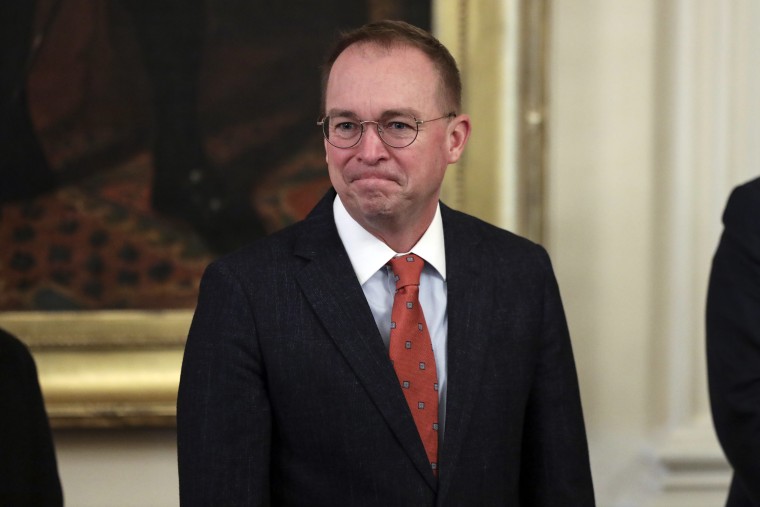The last I saw of Mick Mulvaney, the Republican was featured in a commercial. Was it an ad for a candidate? Maybe a super PAC? No, as it turned out, Mulvaney was in a commercial for a tech company that sells antivirus software.
Mulvaney wasn’t even the star of the commercial. The ad featured dozens of apparent company employees, before adding Mulvaney, who was on screen for only a couple of seconds, toward the end.
Three months later, he appears to have landed an even better gig. My MSNBC colleague Hayes Brown explained:
CBS News announced Tuesday that it had hired Mick Mulvaney.... After the announcement of Mulvaney’s new role as an on-air contributor who will provide “political analysis across the network’s broadcasts and platforms,” Mulvaney immediately appeared on CBS News’ MoneyWatch segment, where he commented on President Joe Biden’s latest budget proposal and, not surprisingly, found it problematic.
Hayes added, “One can only assume that the CBS newsroom leadership has suffered a mass amnesia event.” If so, let’s refresh their memories.
At face value, Mulvaney might appear to be a qualified and experienced voice. After all, Mulvaney was a multi-term member of Congress before Donald Trump tapped the Republican for a variety of jobs, including head of the Consumer Financial Protection Bureau, director of the Office of Management and Budget, White House chief of staff, and U.S. Special Envoy for Northern Ireland.
At a superficial level, someone might see a c.v. like that and assume that Mulvaney could speak with authority and expertise about a wide range of governmental issues.
But that’s why it’s all the more important to look below the surface.

As we discussed several years ago, one of the amazing things about Mulvaney is that he’s mastered the fine art of falling up.
In the not-too-distant past, the South Carolina Republican was a fairly obscure right-wing congressman best known for championing government shutdowns, debt-ceiling crises, and pointless votes to repeal the Affordable Care Act. As recently as 2016, he even accepted a speaking invitation from the John Birch Society.
Congress has always had fringe members, and during his ineffective tenure on Capitol Hill, Mulvaney was not taken especially seriously as a lawmaker.
But Trump saw this as a record worthy of a promotion, elevating Mulvaney to lead OMB, where he peddled conspiracy theories, was at times disconnected from the then-president’s position on budget issues, and where he gave the banking industry some rather crude advice on how best to exploit Capitol Hill corruption.
During Mulvaney’s tenure as budget director, the nation’s finances also took a turn toward the absurd: By some measures, the United States never had a budget deficit that high during a period of strong economic growth. He also unveiled a budget plan with a jaw-dropping $2-trillion mistake — and then insisted his colossal screw-up was intentional.
It was against this backdrop that Trump decided to give Mulvaney additional responsibilities, so the then-president tapped him to lead the CFPB — despite (or perhaps, because of) the fact that Mulvaney opposed the existence of the CFPB. Predictably, he proceeded to gut the agency’s enforcement efforts, aligning the bureau’s priorities with the goals of the payday-lending industry.
And yet, the more Mulvaney’s record took ridiculous turns, the more his boss was impressed. Every failure was followed by a promotion, to the point that Trump also put Mulvaney in charge of the White House — at which point he publicly confessed that Team Trump had illegally extorted our Ukrainian allies, only to then tell reporters, “Get over it.”
Soon after, as the Covid-19 crisis took shape in the United States, Mulvaney said the burgeoning public-health emergency was secretly an elaborate scheme concocted by Trump’s domestic enemies to make the Republican White House look bad in an election year.
As his tenure in the West Wing came to an end, multiple scholars came to the same conclusion: Mulvaney was the single worst White House chief of staff in American history.
There were multiple reports last year highlighting a fascinating trend: While White House veterans generally find it easy to find new jobs, former members of Trump’s team struggled in the job market, tarnished by their former boss’ many scandals. With this in mind, Mulvaney, looking for a way back into polite society, probably had limited employment options.
It was against this backdrop that CBS, for reasons unknown, appears to have thrown Mulvaney a professional life preserver.
But as a rule, tarnished political figures are supposed to earn their way out of the penalty box. What has Mulvaney done to rehabilitate his ruined reputation in the wake of years of failures, scandals and embarrassments?
Related:
